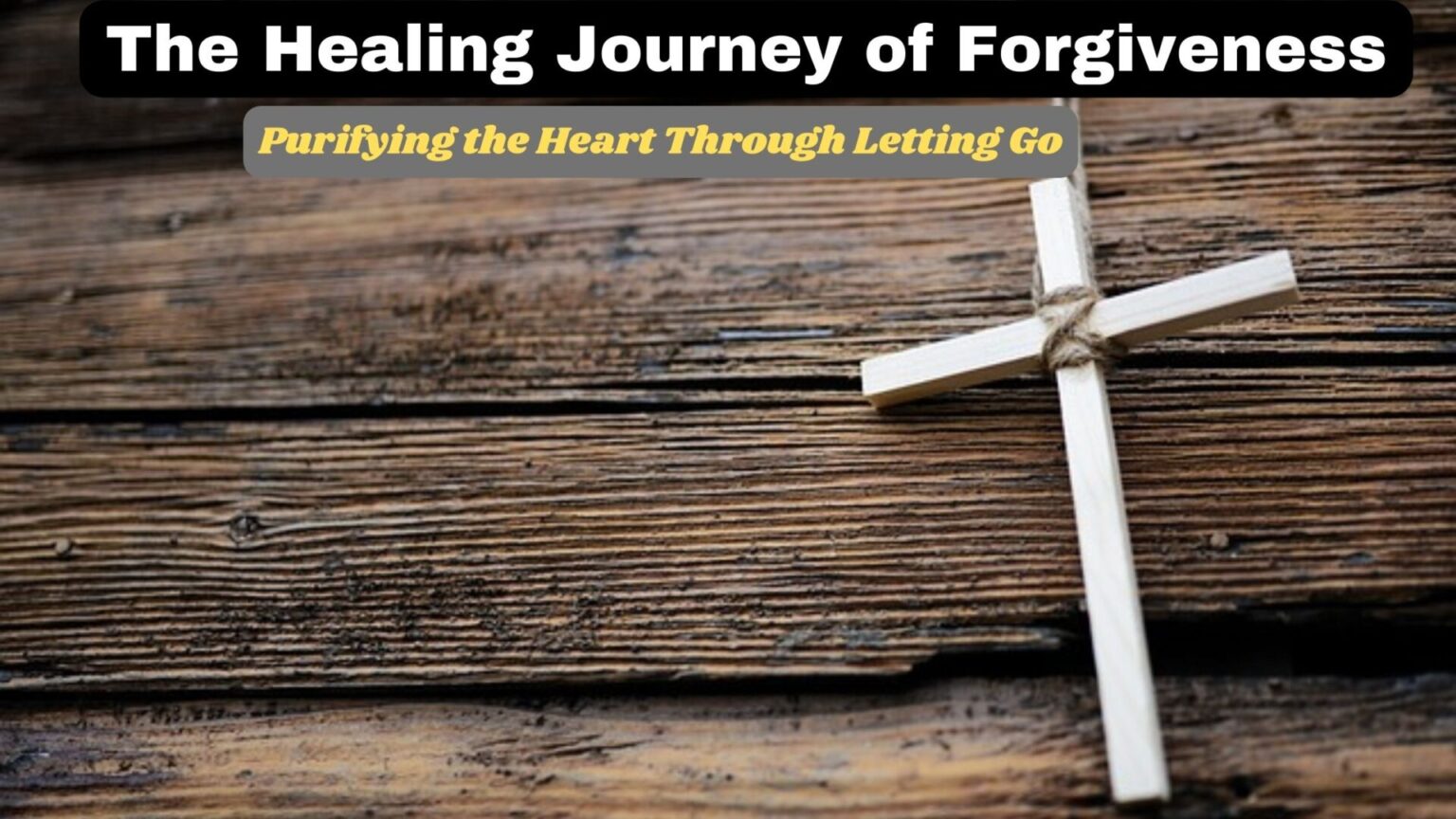Introduction:
The Healing Journey of Forgiveness: Purifying the Heart Through Letting Go

Forgiveness is a guiding light that illuminates the path towards healing and inner peace in the depths of the human experience. It has a transformative power that can purify the heart and bring comfort to those who carry resentment and pain. When we choose to embark on the journey of forgiveness, we embark on a profound quest for liberation. This journey requires us to release the past and embrace the possibility of renewal.
Forgiveness can help us overcome unresolved resentment that can weigh us down and trap us in pain. It involves letting go of the grip of bitterness and opening ourselves up to the possibility of redemption. Compassion is at the heart of forgiveness, which can help us transcend our ego and embrace the interconnectedness of all beings. Self-forgiveness is also important. As we journey towards forgiveness, we shed the layers of bitterness and embrace the boundless possibilities of the present moment. Forgiveness offers a testament to the resilience of the human spirit and restores us to wholeness.
The Healing Journey of Forgiveness
Forgiveness plays a crucial role in inner healing in several ways:
- Release of Resentment and Anger: Holding onto anger and resentment can be emotionally and physically taxing. Forgiveness allows you to let go of these negative emotions, freeing up mental and emotional energy for healing.
- Reduced Stress: Carrying grudges and harboring resentment can lead to chronic stress, which negatively impacts both physical and mental health. Forgiveness can help reduce stress levels by promoting feelings of peace and acceptance.
- Promotion of Emotional Well-being: Forgiveness can lead to greater emotional well-being by fostering feelings of empathy, compassion, and understanding towards oneself and others. This can improve overall mood and outlook on life.
- Rebuilding Trust and Relationships: Forgiveness can pave the way for reconciliation and rebuilding of relationships that may have been strained or broken. This can provide a sense of closure and restore a sense of connection and support.
- Personal Growth and Transformation: Choosing to forgive can be a transformative experience, leading to personal growth and increased resilience. It requires introspection, empathy, and a willingness to let go of past hurts, which can ultimately lead to greater self-awareness and emotional maturity.
Overall, forgiveness is not only about letting go of the past but also about reclaiming power over one’s own emotions and experiences, ultimately contributing to inner healing and a sense of wholeness.
How do you forgive someone who has deeply hurt you?
Forgiving someone who has deeply hurt you can be a challenging process, but it is possible with time, effort, and self-reflection. Here are some steps to consider:

1. Acknowledge Your Feelings: Allow yourself to fully acknowledge and experience the emotions you are feeling, whether it’s anger, sadness, betrayal, or resentment. It’s essential to validate your emotions before you can begin to work through them.
2. Understand the Impact: Take time to understand the impact of the hurt on your life and well-being. Reflect on how holding onto resentment or anger may be affecting you emotionally, mentally, and even physically.
3. Practice Empathy: Try to understand the perspective of the person who hurt you. Consider their motivations, background, and circumstances that may have contributed to their actions. Practicing empathy can help soften your heart and foster compassion.
4. Set Boundaries: While forgiveness is important for your own healing, it’s also crucial to set boundaries to protect yourself from further harm. Establish clear boundaries with the person who hurt you to prevent similar situations from occurring in the future.
5. Release Resentment: Holding onto resentment only prolongs your suffering. Practice letting go of negative emotions by consciously choosing to release resentment and bitterness. This may involve forgiveness meditation, writing a letter (even if you don’t send it), or engaging in therapeutic techniques like cognitive-behavioral therapy (CBT).
6. Focus on Healing: Redirect your energy towards activities and practices that promote healing and self-care. This could include mindfulness meditation, journaling, spending time with supportive loved ones, engaging in hobbies, or seeking professional therapy or counseling.
7. Work on Self-Forgiveness: Forgiving yourself for any role you may have played in the situation is also important. Recognize that everyone makes mistakes, and self-compassion is crucial for your own healing journey.
8. Give Yourself Time: Forgiveness is a process that takes time and may not happen overnight. Be patient and gentle with yourself as you navigate through your feelings and work towards forgiveness.
9. Seek Support: Don’t hesitate to seek support from trusted friends, family members, or a therapist who can provide guidance, validation, and encouragement as you navigate the forgiveness process.
What are the benefits of forgiveness for mental health?
Forgiveness offers numerous benefits for mental health:
1. Forgiveness can reduce stress and anxiety by letting go of negative emotions and creating space for relaxation and inner peace.
2. Forgiveness promotes positive emotions such as empathy, compassion, and gratitude, which can improve overall mood and well-being. It helps shift focus away from anger and bitterness towards more uplifting emotions, leading to an improved mood.
3. Forgiveness cultivates resilience by teaching individuals to adaptively cope with life’s challenges and setbacks. It encourages a mindset of growth and learning from difficult experiences rather than being consumed by them, which enhances resilience.
4. Forgiving others can lead to healthier and more satisfying relationships by fostering empathy, communication, and understanding. These are essential for building and maintaining strong connections with others.
5. Forgiveness can boost self-esteem by empowering individuals to assert their own worth and value, regardless of past hurts or betrayals. It shifts the focus from being a victim of circumstances to being a proactive agent of one’s own happiness, which increases self-esteem.
6. Forgiveness promotes emotional regulation by helping individuals process and manage difficult emotions effectively. It teaches constructive ways of dealing with anger, resentment, and other negative feelings, which enhances emotional regulation.
7. Forgiveness has been linked to decreased symptoms of depression, as it allows individuals to release the burdens of past grievances and experience greater emotional freedom, leading to reduced symptoms of depression.
8. The mental health benefits of forgiveness can also translate into improved physical health. Reduced stress, better mood, and enhanced coping skills can contribute to a stronger immune system, lower blood pressure, and overall better physical well-being.
Frequently Asked Questions
What is forgiveness, and why is it important?
Forgiveness is the act of letting go of resentment, anger, and the desire for revenge toward someone who has wronged you. It is important for mental, emotional, and spiritual well-being, as holding onto negative emotions can lead to increased stress, anxiety, and resentment.
- Does forgiving someone mean condoning their actions?
No, forgiving someone does not mean condoning or excusing their actions. It means acknowledging the hurt they caused while choosing to release the negative emotions associated with it, thus freeing yourself from the burden of resentment.
- Is forgiveness a sign of weakness?
On the contrary, forgiveness requires strength and courage. It takes inner strength to confront and process painful emotions, as well as the courage to let go of resentment and embrace compassion and understanding.
- Can forgiveness benefit both the forgiver and the forgiven?
Yes, forgiveness can benefit both parties involved. For the forgiver, it offers emotional liberation and inner peace. For the forgiven, it can provide an opportunity for redemption, healing, and reconciliation.
- How do I forgive someone who has deeply hurt me?
Forgiveness is a process that may take time and effort. It begins with acknowledging your emotions, allowing yourself to feel and express them in a healthy way. It also involves cultivating empathy and understanding toward the person who hurt you, and ultimately, making the conscious decision to let go of resentment for your own well-being.
References:
- Worthington Jr., Everett L. “Forgiveness and Reconciliation: Theory and Application.” Routledge, 2006.
- Enright, Robert D., and Joanna North. “Exploring Forgiveness.” University of Wisconsin Press, 1998.
- Luskin, Fred. “Forgive for Good: A Proven Prescription for Health and Happiness.” HarperOne, 2003.
- McCullough, Michael E., Kenneth I. Pargament, and Carl E. Thoresen. “Forgiveness: Theory, Research, and Practice.” Guilford Press, 2000.
- Rye, Mark S., Everett L. Worthington Jr., and Parrott, Lesley III. “Forgiveness and Health: Scientific Evidence and Theories Relating Forgiveness to Better Health.” Springer, 2015.






